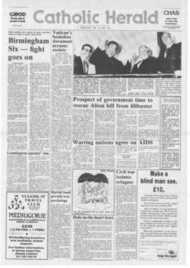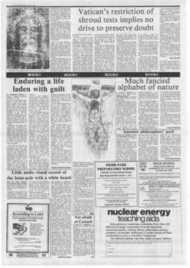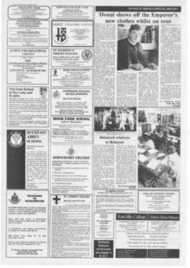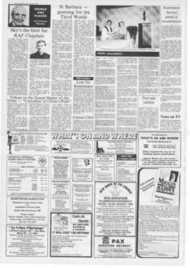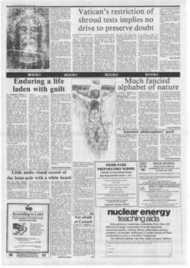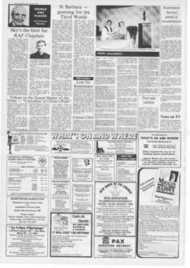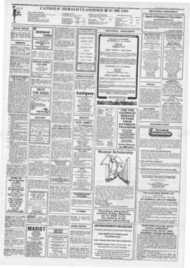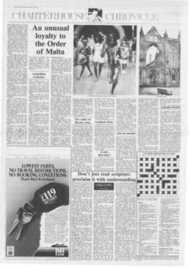Page 2, 5th February 1988
Page 2

Report an error
Noticed an error on this page?If you've noticed an error in this article please click here to report it.
Tags
Share
Related articles
The Pope's Divisions
Pope Not Typical Florida Tourist
A Solemn Office Becomes A Grassroots Mission
`how Many Divisions Has The Pope?'
Pope's late answer to Stalin's question
STALIN'S scornful question "How many divisions has the Pope?" received a tardy response recently from John Paul II who mentioned that there are Catholics in Kazakastan. Not divisions of them perhaps, but certainly a Company.
He mentioned them at the Foreign Press Club in Rome while responding to a question about the prospects of a trip to USSR Catholics. Some Ukrainian and Lithuanian Catholics have been trouble enough without adding Kazakastani Catholics.
His comments about Kazakastan represented a new twist in a response to a question which John Paul had fielded before, on his flight to Australia in 1986. The Pope also shifted his emphasis: at 30,000 feet over the Red Sea, he had been at pains to explain that he might go to the 1988 celebrations of the thousandth year of Christianity in the USSR, but would not let himself be used for political purposes.
At the Rome Press Club, however, he said first of all that a visit to the USSR would "improve international
understanding". That's what Mikhael Gorbachev wants also isn't it? He also mentioned its specifically religious significance provided he could meet Catholics — and he specified that they were present not only in the Ukraine, Lithuania and Latvia but also in ByeloRussia, Kazakastan and Central Asia. He acknowledged the importance of the celebrations of the 1000th Year of Christianity in the USSR but did not seem to see any prospects of attending them.
Indeed, he said he had not been invited to the USSR and that the thorny question of the Byzantine-Rite Ukrainian Catholic Church had not been discussed with the Orthodox.
The day after the Pope's Rome Foreign Press Club statement, a spokesman for the Soviet Ministry of Foreign Affairs, Gennad Gerasimov, said a papal visit to the Soviet Union was not foreseen and that if, as anticipated, Gorbachev comes to Rome he is not expected to seek an audience with the Pope.
As if in response to John Paul saying, at the Press Club, that he would be "faithful to the Byzantine-Rite Ukrainian
Desmond O'Grad unveils the concerns behind a rumoured visit to Russia by the Pope
Catholic Church as it had been faithful to the Pope", the Soviet news agency "Novostni" reaffirmed that "there is no such thing as a Byzantine-Rite Ukrainian Catholic Church" (it has been clandestine since a "takeover" by the Russian Orthodox Church in 1946).
On January 25, "Novostni" compared John Paul II unfavourably with Paul VI and John XXIII and among other things accused him of encouraging nationalistic sentiments.
It seems a cold war is looming but John Paul is undaunted. That same day (25th) he announced that he was about to publish not one but two documents on this year's celebrations of a thousand years of Christianity in the USSR — one addressed to the Orthodox, the other to the Byzantine-Rite
Ukrainian Catholic Church, even Thousandth Year of Christianity
Sd. • 1,
not exist. John Paul sees both the Byzantine-Rite Ukrainian Catholics and the Russian Orthodox as descendants of Vladimir, the Chieftain who "baptised" all his people in the Dnieper at Kiev in 988.
Moscow's testiness with John Paul may be only temporary. Soviet attitudes to the Pope alternate between the amicable and the stern. The Soviet Union has shown a recent interest in wooing Catholics by inviting prominent church people to visit the USSR, and the image of Gorbachev's new Soviet Union will not benefit if John Paul periodically announces that he has been prevented from visiting Catholics in the USSR who total perhaps ten million.
Through a Glasnost gesture, a trip may be feasible eventually, even though the obstacles are daunting. The major ones are the situations of the Church in Lithuania and the Ukraine.
Presumably the controversial issues regarding Ukrainian Catholics will be broached in the two documents on the One January 25, said he was about to publish. It will be a feat if he manages to do so without raising a storm of controversy.
John Paul wants desperately to achieve Catholic-Orthodox unity, but at the Rome Foreign Press Club he said the ByzantineRite Ukrainian Catholic Church's situation must be discussed "in truth" between Catholic and Pan-Orthodox representatives. This was a new suggestion which may complicate already intricate problems. Formerly it was presumed the issue wouldbe handled bilaterally between the Vatican and the Russian Orthodox, but now John Paul suggests it be placed on the agenda of meetings with representatives of all the Orthodox Churches. for some years theological discussions have been underway, not without difficulties, between the Vatican and the Pan-Orthodox. Would the Pan-Orthodox representatives have the courage to tackle the Russian Orthodox over the situation of Ukrainian Catholics and, if so, would it have any effect?
blog comments powered by Disqus


